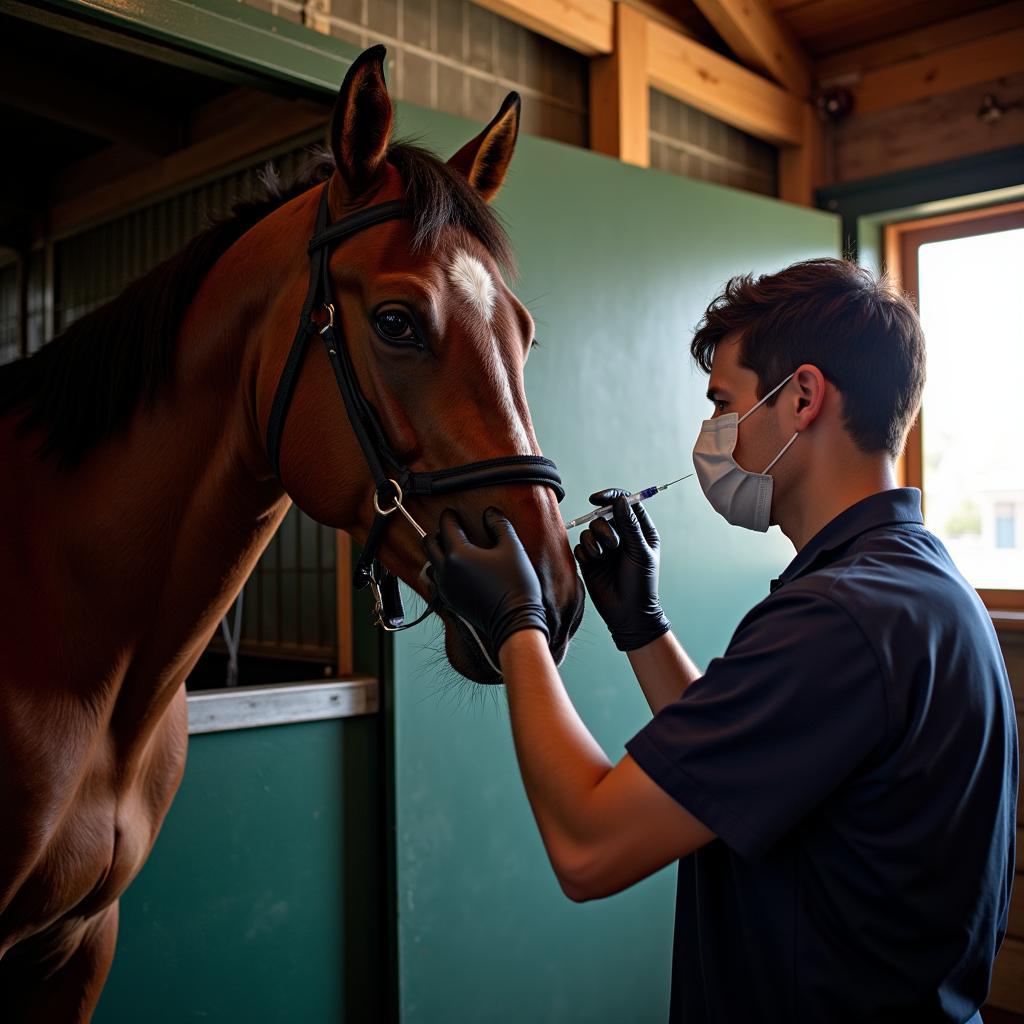Race Horse Medications are a complex and often controversial topic. Understanding their use is crucial for anyone involved in the horse racing industry, from owners and trainers to veterinarians and even fans. This guide dives deep into the world of race horse medications, exploring their purposes, regulations, and the ongoing debate surrounding their use.
The Purpose of Race Horse Medications
 Race Horse Receiving Medication
Race Horse Receiving Medication
Race horses, like all athletes, are susceptible to injuries and illnesses. Medications play a vital role in maintaining their health and well-being, ranging from preventing disease to managing pain and inflammation. Just like you might take charcoal for horses for digestive health, race horses require specific medications tailored to their demanding lifestyle. Some common uses of medications in racehorses include:
- Pain Management: Intense training can lead to soreness and injuries. Pain medications help horses stay comfortable and continue training.
- Inflammation Reduction: Swelling and inflammation are common after strenuous exercise. Anti-inflammatory drugs can reduce these symptoms and promote healing.
- Infection Control: Horses can be exposed to various infections. Antibiotics are used to treat bacterial infections and prevent their spread.
- Respiratory Health: Maintaining healthy airways is essential for optimal performance. Medications can help manage respiratory conditions like allergies and infections.
- Gastrointestinal Support: Digestive issues can impact a horse’s performance. Medications can help regulate gut function and prevent ulcers.
It’s important to remember that all medication use should be overseen by a qualified veterinarian.
Navigating the Regulations of Race Horse Medications
The use of medications in horse racing is strictly regulated to ensure fair competition and protect the horses’ health. These regulations vary by jurisdiction and are constantly evolving. Understanding these rules is crucial for all involved, as violations can lead to disqualifications, fines, and suspensions. Some key aspects of medication regulations include:
- Permitted Medications: Certain medications are allowed for therapeutic use, but their administration must be documented and adhere to specific withdrawal times before a race.
- Prohibited Substances: Certain drugs are banned entirely due to their potential to enhance performance or pose a risk to horse health.
- Testing Procedures: Horses are regularly tested for prohibited substances, both pre- and post-race. These tests are conducted using sophisticated methods to detect even trace amounts of drugs.
- Withdrawal Times: Regulations specify how long a horse must be off a particular medication before racing to ensure it doesn’t influence their performance.
Knowing the specific regulations in your racing jurisdiction is essential for responsible medication use. Are you considering eye coverings for horses? Be sure to check their legality in your area as well.
The Ongoing Debate: Balancing Welfare and Fairness
The use of medications in horse racing is a subject of ongoing debate. While medications are essential for maintaining horse health, concerns remain about their potential misuse for performance enhancement. Finding the right balance between welfare and fairness is a challenge for the industry. Some key points of discussion include:
- Therapeutic vs. Performance-Enhancing: Distinguishing between medications used for legitimate therapeutic purposes and those used to gain an unfair advantage is a critical issue.
- Long-Term Health Effects: The long-term impact of certain medications on horse health is still being studied. Understanding these effects is crucial for ensuring horse welfare.
- Uniformity of Regulations: The lack of consistent regulations across different jurisdictions creates challenges for horse owners and trainers who compete in multiple locations.
The debate surrounding race horse medications is complex and requires careful consideration of ethical, scientific, and practical factors.
Conclusion
Race horse medications are an integral part of the equine racing industry. Understanding their purpose, regulations, and the ongoing debate surrounding their use is crucial for responsible horse care and fair competition. By staying informed and adhering to the latest guidelines, we can ensure the health and well-being of these magnificent athletes while maintaining the integrity of the sport. If you suspect your horse has tendinitis, consult your vet immediately.
FAQs
- What are the most common medications used in racehorses? Commonly used medications include non-steroidal anti-inflammatory drugs (NSAIDs), antibiotics, and medications for respiratory and gastrointestinal health.
- Who regulates the use of medications in horse racing? Regulation varies by jurisdiction, typically overseen by racing commissions or similar governing bodies.
- What happens if a horse tests positive for a prohibited substance? Penalties for positive drug tests can include disqualification, fines, and suspensions for the trainer and owner.
- Are there any natural alternatives to medications for racehorses? Some horse owners explore alternative therapies like acupuncture and chiropractic care, but these should be used in conjunction with veterinary guidance.
- How can I learn more about the specific medication rules in my area? Contact your local racing commission or consult with an equine veterinarian familiar with racing regulations.
- What is the role of a horse endoscopy in diagnosing and treating respiratory issues? Horse endoscopy plays a crucial role in allowing veterinarians to visualize and diagnose various respiratory conditions.
- How does a horse stall card contribute to medication management and overall horse care? A meticulously maintained horse stall card provides a centralized record of medications administered, ensuring accurate tracking and preventing potential overdoses or adverse reactions.
Do you need a horse stall card for better organization? Check out our resources on horse stall card. For further reading on equine health, check out our articles on charcoal for horses and tendinitis horse. You can also find helpful information about eye coverings for horses and horse endoscopy.
Need support? Contact us at 0772127271, email [email protected], or visit us at QGM2+WX2, Vị Trung, Vị Thuỷ, Hậu Giang, Việt Nam. We have a 24/7 customer support team.